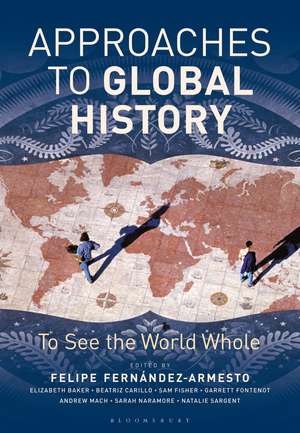Approaches to Global History: To See the World Whole
Editat de Felipe Fernandez-Armestoen Limba Engleză Paperback – 11 ian 2023
| Toate formatele și edițiile | Preț | Express |
|---|---|---|
| Paperback (1) | 256.54 lei 3-5 săpt. | +64.10 lei 4-10 zile |
| Bloomsbury Publishing – 11 ian 2023 | 256.54 lei 3-5 săpt. | +64.10 lei 4-10 zile |
| Hardback (1) | 720.30 lei 6-8 săpt. | |
| Bloomsbury Publishing – 11 ian 2023 | 720.30 lei 6-8 săpt. |
Preț: 256.54 lei
Preț vechi: 290.78 lei
-12% Nou
Puncte Express: 385
Preț estimativ în valută:
49.09€ • 53.31$ • 41.24£
49.09€ • 53.31$ • 41.24£
Carte disponibilă
Livrare economică 01-15 aprilie
Livrare express 15-21 martie pentru 74.09 lei
Preluare comenzi: 021 569.72.76
Specificații
ISBN-13: 9781474286633
ISBN-10: 1474286631
Pagini: 376
Dimensiuni: 169 x 244 x 25 mm
Greutate: 0.64 kg
Editura: Bloomsbury Publishing
Colecția Bloomsbury Academic
Locul publicării:London, United Kingdom
ISBN-10: 1474286631
Pagini: 376
Dimensiuni: 169 x 244 x 25 mm
Greutate: 0.64 kg
Editura: Bloomsbury Publishing
Colecția Bloomsbury Academic
Locul publicării:London, United Kingdom
Caracteristici
Supported by a substantial introduction written by Felipe Fernandez-Armesto with short introductions to each reading, setting them in their context and explaining their influence
Notă biografică
Felipe Fernandez-Armesto is William P. Reynolds Professor of History at the University of Notre Dame, USA. Some of his recent publications include 1492: The Year Our World Began (2011), Pathfinders: A Global History of Exploration (2006) and The Conquistadors: A Very Short Introduction (2011).
Cuprins
IntroductionPart I: Prophecy and Providentialism 1. The Book of Daniel, Chapters 7-122. Paulus Orosius, Seven Books Against the Pagans, Dedication, From Book I, Section 1 and from Books II (Section 1), V (Sections 1-2) and VII (Sections 1-3)3. M. Reeves, Joachim of Fiore and the Prophetic Future, From Chapter 1, "Joachim and the Meaning of History"4. From Ibn Khaldun, The Muqaddimah: An Introduction to HistoryPart II: From Providence to Progress 5. Johann Gottfried Herder, Outlines of a Philosophy of the History of Man, Book XV, Chapters 1-56. Immanuel Kant, Idea for a Universal History from a Cosmopolitan Point of View, On History [1784]7. G.W.F. Hegel, Lectures on the Philosophy of World History, "The Course of the World's History," vol. iii, sections 60-99.8. Karl Marx and Friedrich Engels, Manifesto of the Communist Party [1848], Chapter 19. Leopold von Ranke, Universal History: The Oldest Historical Group of Nations and the Greeks [1884], Preface Part III: The Scientific Temptation 10. Herbert Spencer, "Progress: Its Law and Consequences" [1886], Chapter 111. Christopher Dawson, The Age of the Gods [1928], "Introduction"12. David Christian, "World History in Context" [2003]13. Richard Lewontin and Joseph Fraccia, "Does Culture Evolve?" [1994]14. Felipe Fernández-Armesto, "How to be Human: A Historical Approach" [2010]15. Daniel Lord Smail, "Neuroscience and the Dialectics of History" [2012] Part IV: Comparative and Contextual Approaches 16. Ian G. Simmons, '"To Civility and Man´s Use": History, Culture, and Nature' [1998]17. Jared M.Diamond, "Colonization Cycles in Man and Beast" [1977]18. Kenneth Pomeranz, "Social History and World History from Daily Life to Patterns of Change" [2007]19. Bruce Mazlish, "Comparing Global History to World History" [1998] Part V: The Eurocentrism Controversies 20. Arnold J. Toynbee, "My View of History" [1948]21. Samuel Huntington,. "The Clash of Civilizations" [1993]22. J.C. van Leur, Indonesian Trade and Society: Essays in Asian Social and Economic History [1967], Chapter 1: "On Methodology and Theory"23. W.H. McNeill, "A Defence of World History" [1982] Envoi: The New Narratives 24. David Christian, "The Return of Universal History" [2010]25. David Northrup, "Globalization and the Great Convergence: Rethinking World History in the Long Term" [2008]
Recenzii
In spirit, global history is an age-old endeavour. At the same time, each manifestation is highly specific to its moment, with its own particular set of constraints and possibilities. Prof. Fernández-Armesto shows this with aplomb for the Western tradition, not just through the essays, which are judiciously chosen, but also through his introductory remarks, which are written with flare and a telling eye, highlighting the import of their subject for both students and scholars.
